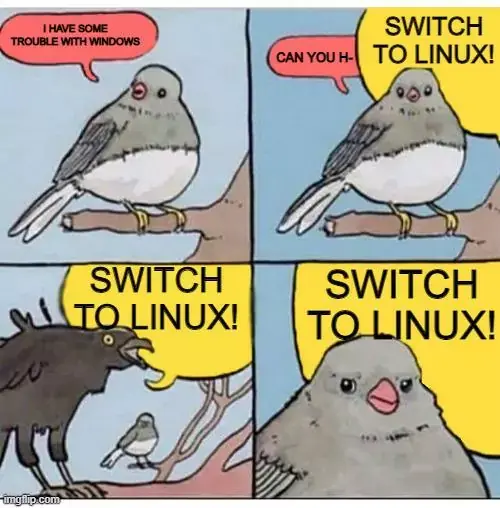this post was submitted on 05 Jul 2023
552 points (96.8% liked)
linuxmemes
27829 readers
2029 users here now
Hint: :q!
Sister communities:
Community rules (click to expand)
1. Follow the site-wide rules
- Instance-wide TOS: https://legal.lemmy.world/tos/
- Lemmy code of conduct: https://join-lemmy.org/docs/code_of_conduct.html
2. Be civil
- Understand the difference between a joke and an insult.
- Do not harrass or attack users for any reason. This includes using blanket terms, like "every user of thing".
- Don't get baited into back-and-forth insults. We are not animals.
- Leave remarks of "peasantry" to the PCMR community. If you dislike an OS/service/application, attack the thing you dislike, not the individuals who use it. Some people may not have a choice.
- Bigotry will not be tolerated.
3. Post Linux-related content
- Including Unix and BSD.
- Non-Linux content is acceptable as long as it makes a reference to Linux. For example, the poorly made mockery of
sudoin Windows. - No porn, no politics, no trolling or ragebaiting.
4. No recent reposts
- Everybody uses Arch btw, can't quit Vim, <loves/tolerates/hates> systemd, and wants to interject for a moment. You can stop now.
5. 🇬🇧 Language/язык/Sprache
- This is primarily an English-speaking community. 🇬🇧🇦🇺🇺🇸
- Comments written in other languages are allowed.
- The substance of a post should be comprehensible for people who only speak English.
- Titles and post bodies written in other languages will be allowed, but only as long as the above rule is observed.
6. (NEW!) Regarding public figures
We all have our opinions, and certain public figures can be divisive. Keep in mind that this is a community for memes and light-hearted fun, not for airing grievances or leveling accusations. - Keep discussions polite and free of disparagement.
- We are never in possession of all of the facts. Defamatory comments will not be tolerated.
- Discussions that get too heated will be locked and offending comments removed.
Please report posts and comments that break these rules!
Important: never execute code or follow advice that you don't understand or can't verify, especially here. The word of the day is credibility. This is a meme community -- even the most helpful comments might just be shitposts that can damage your system. Be aware, be smart, don't remove France.
founded 2 years ago
MODERATORS
you are viewing a single comment's thread
view the rest of the comments
view the rest of the comments

The ones that make me laugh uncontrollably are those Windows disk encryption issues for which the solution is…wait for it… run Linux from a LiveISO, fix the disk with Linux, then reinstall Windows. Because Windows is incapable of fixing its own issues that it itself caused.
As a former computer service technician, we used Ubuntu Live USB and DVDs (yes it was a long ago) a lot.
Windows lacking tooling to fix issues caused by its own malfeasance was what made my switch to Linux permanent. I used a LiveCD to fix file system issues that Windows had no tools for unless I wanted to pay thousands for janky third-party tools. Once I did that and recovered most of my lost data, I thought long and hard and just said "fuck it, I'll use Linux".
None of my family will run Linux, however, on my recommendation. I can cope with Linux's ... selective set of user friends. They can't, and I'll be damned if I turn into free tech support.
I remember something happened to my family's Windows computer once. A system file had gotten corrupted somehow so it could only boot into the repair utility, which, naturally, couldn't repair the file.
The solution I found on Google was to put in the installation disc (I think it was Windows 7?), run the disc at startup (by switching the boot order in the BIOS), and fix it using Command Prompt on the disc.
Windows' own diagnostic tool included with the OS couldn't fix the problem. Only the disc could. It was pretty fortunate we still had that thing. Until then, it had just been sitting there collecting dust.